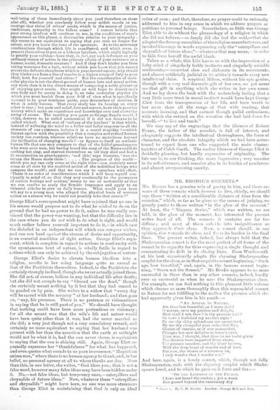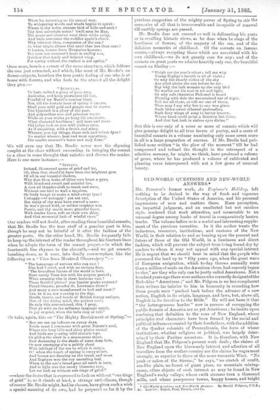MR. BRODIE'S SONNETS.*
Me. Baontt: has a genuine vein of poetry in him, and there art some of these sonnets which deserve to live, chiefly, we should say, those "written at a considerable distance of time from the occasion," which, so far as he gives us the means of judging, we greatly prefer to those written "in the glow of the moment.' At least, the "Niagara Series," which was written, we are told, in the glow of the moment, has interested the preseut writer least of all. The sonnets it contains are far toodiffuse ; and most of them sub ale into insignificance as they approa-di eleir close. Nov. a sonnet should, in our Opinion, rise towards its close, and rocas its burden in the final lines. The present writer, indeed, has always held that the Shakespearian sonnet is far the most perfect of all forms of the sonnet in its capacity for thus expressing a single thought and concentrating its drift in its closing lines. Even Wordsworth at his best occasionally adopts the rhyming Shakespearian couplet for the close, as in that exquisite sonnet beginning," Such age, how beautiful," and, again, in the famous sonnet beginning, "Scorn not the Sonnet." Mr. Brodie appears to us more successful in these than in any other sonnets, indeed, hardly ever so successful as when he use3 the Shakespearian close. For example, we can find nothing in this pleasant little volume which charms us more thoroughly than this reproachful sonnet to Nature for not fulfilling to the author the promise which she had apparently given him in his youth :— "Ax APPEAL TO NATURE.
Art thou less beautiful, or I more dull ?
0 nature, once my passion and delight, How shall I win thee ? is thy promise null?
Or have I forfeited my ancient right ?
By me thy skiey splendours are uuwatehed, By me thy changeful year unheeded Glories of sunrise, or of eve unmatched, Changes but new delights to lover's eyes.
Time was, I thought, that thou to me hadst given The dearest boon imparted from above, The greener meadow, and the bluer heaven, With the deep heart of wonder and of love.
But now, the sharer of a common lot,
I only wonder that I wonder not."
And here, again, is a lovely sonnet, which, though not fully Shakespearian, end.s with the rhyming couplet which Shakespeare loved, and to which he gave such force and fire :— "ON THE LATENESS OF TIIE CUCKOO. I have not heard the cuckoo ; yet a week Has passed beyond the customary day
When he, returning on his annual way, To whispering woods and winds begins to speak : Where is thy voice, strange bird of hide-and-seek ?
Thy first uncertain notes? 'twill soon be May, The pears and cherries wear their white array, And buds announce the ruddier apple's cheek.
Why loiterest thou, companion of the sun ?
In what bright climes that need thee less than ours ?
0 hasten, hasten from Hesperian bowers ; Too soon our summer's lease is swiftly run, Quicken that tardy and belated wing, For spring without the cuckoo is not spring."
Once more, here is a sonnet of the same structure, which follows the one just extracted, and which, like most of Mr. Brodie's on flower-subjects, breathes the true poetic feeling of one who is at home with flowers, and who feels to the utmost all the delight they give :— AURICL7LAS.
Ye have indeed a glory of your own, Auriculas, and keep yourselves till last, Fearful of icy March's roaring blast, Nor, till the certain hour of spring is known, Shall your mild gold and purple vest be shown.
The hyacinth is a glory of the past,
And polyanthus now and primrose waste,
While on your stalks ye hang till overblown.
What clustered loveliness ! still here and there Old tulips look on you with jealous eyes,
As if enquiring, with a frown and stare, Whence, you toy things, those rich and velvet dyes ?
No matter whence, best and most opportune,
Ere scarlet summer's burst and rosy June."
'We will even say that Mr. Brodie never uses the rhyming -couplet at the close without succeeding in bringing the sonnet to a close in some thought that satisfies and charms the reader. Here is one more instance :— " IRELAND.
Ireland, ill-omened name of grief and ire,
Oh, thou that should'st have been the brightest gem Of all in our imperial diadem, Why dost thou make of thine own heart a pyre, With blood-red sword and suicidal fire, A tree all thunder-cleft to trunk and stem, Without one bird to wail a requiem, Or leafy bough to make a wind-swept lyre ?
Unhappy-0 unhappy ! yet not one, But many of thy sons have carved a name In war's proud field, or milder trophies won Poetic, and thy maids more graceful fame, With tender faces, soft as their own skies, And that memorial look of wistful eyes."
Our readers will not doubt, after reading these beautiful sonnets, that Mr. Brodie has the true stuff of a genuine poet in him, though he may not be brimful of it after the fashion of the greater poets. On the other hand, Mr. Brodie frequently fails to keep up the interest of the reader throughout his fourteen lines when he adopts the form of the sonnet proper,—in which the fourteenth line rhymes to the eleventh,—and we get sonnets breaking down, as it were, into deadly commonplace, like the following on a "View from Montreal Observatory ":—
" The horoscope of nations who can cast ?
Else had I cried, and with no envious fear, The boundless future of the world is here, Hero surely Time has with his sceptre passed ; What meaning else in these horizons vast ?
Those fruitful plains? you barrier peaks austere ?
Proud Ottawa, prouder St. Lawrence there ?
And many a tree transformed to hull and mast ?'
Yea, be it so, nor wanting to the day, Heads, hearts, and hands of British stamp antique, Men of the daring mind, the patient seal; Be only this remembered, this, I pray, That ye with us the selfsame language speak, In joy or grief, when the bells ring or toil."
Or take, again, this on "The Mighty Ravishment of Spring,"— " Box me not up indoors on sunny days, Needs must I commune with great Nature's soul, Where the long hills and skiey plains outroll And birds are pouring wild ecstatic lays, Or glides the river in a murmurous maze, Now darkening in the shade of some deep hole, Or now emerging o'er a pebbly shoal With inklings of the sea to which it strays. 0! when the touch of spring is everywhere, And beams are dancing on the trunk and moss And Zephyrs woo the coy uncurling leaf, When to the sun's broad gaze all earth is bare, And in light airs the snowy blossoms toss, Let me look on without one tinge of grief."
—where the desire that is expressed to look on without "one tinge of grief" is, as it stands at least, a strange anti-climax, though of course Mr. Brodie might, had he chosen, have given such a wish -a special meaning of its own, had he prepared us for it by the previous suggestion of the mighty power of Spring to stir the memories of all that is irrecoverable and incapable of renewal till earthly springs are passed.
Mr. Brodie does not succeed so well in delineating his poets or in recalling historic views, as he does when he sings of the loveliness of flowers, of the majesty of the sea, and of the delicious memories of childhood. Of the sonnets on famous scenes,—always excepting those which are associated with his own childhood,—we do not greatly care for any ; and of the sonnets on great poets we admire heartily only one, the beautiful sonnet on Shelley :—
"Weigh me the rose's odour ; tell me why Young Zephyr's breath is all of violet ; Or why the cloudy riches of the sky Are piled above the sun before he set : Say why the lark mounts up the only bird To warble out his soul in air and light, Or why sole chantress Philomel is heard Piercing with dole the nneurtained ear of night. Tell me all these, or tell me one of these, Then may I say why but to one was given Such bitter-sweet ethereal psalmodies, Such fiery wings of song to batter heaven. Whose band could paint a Beatrice but thine, And that last look in sinless eyes divine."
But this is one only of a score or more of sonnets which will give genuine delight to all true lovers of poetry, and a score of beautiful sonnets in a volume numbering only some seven score in all is a large proportion of success. If Mr. Brodie had published none written "in the glow of the moment" till he had compressed and refined the thought in the retrospect of a selective memory, he might, we think, have produced a volume of gems, where he has produced a volume of cultivated and pleasing verse interspersed with not a feW gems of unusual beauty.



































 Previous page
Previous page